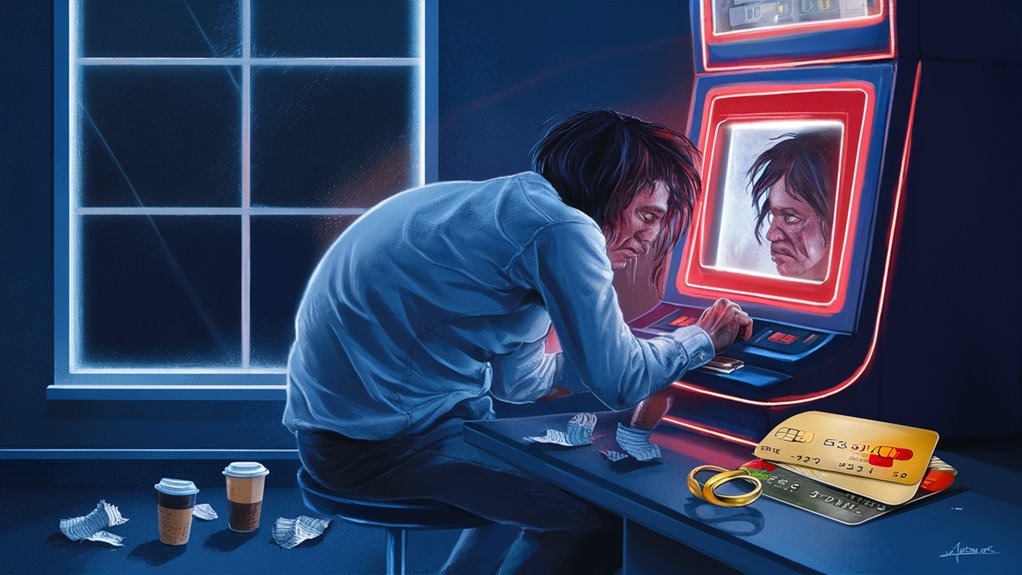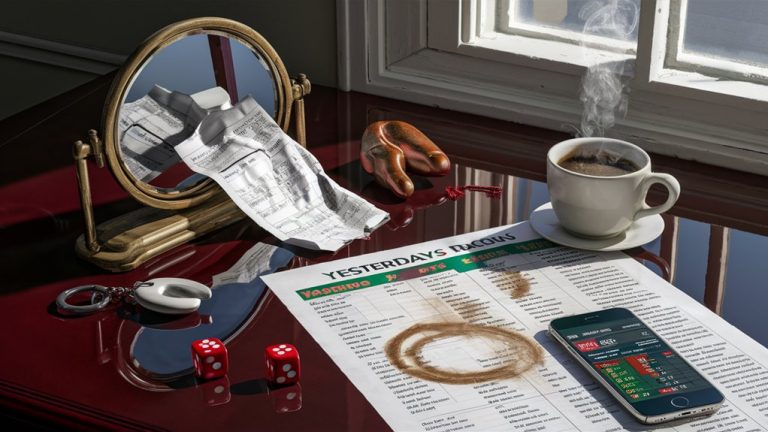
How to Tell If You Have a Gambling Problem
Warning Signs and Red Flags
There are many ways signs start to arise that someone may have a gambling problem, but finance is often the first clearest indicator with significant movement on this front: frequent withdrawals from savings accounts, maxed-out credit cards, sale of personal possessions to fund paid-for gambling activities, borrowing money solely for gambling purposes.
Behavioral Changes
Time management issues often surface as gambling becomes compulsive:
Extended gambling sessions of hours or even days. Skipping work meetings or calling in sick to bet on the races. Neglecting the family job – anything you should be doing with your kids. Deceiving loved ones and others about the level of gambling activities.
Emotional and Physical Symptoms
Psychological Trouble spots include:
Extreme mood swings between winning and Arc-lent Bets losing periods, fluctuating between elation and depression with every spin of the wheel. Feelings of intense anxiety when unable to get into gambling on time. Gambling to escape from stress and/or depression. Preoccupation with betting on games or playing at a casino.
Physical symptoms can also result:
Changes in sleep patterns, including frequent waking. Digestive problems linked to stress. The tension also produces interference with digestion and increases the likelihood of experiencing constant indigestion. Appetite changes. Restlessness when trying to stop gambling.
When to Seek Help
Taking immediate action is eminently appropriate in these circumstances. Professional help is essential when:
You have a number of problem signs occurring at the same time. Measures of self-control are not working. Gambling is affecting your ability to function on a daily basis. The threat to financial stability is real and very great indeed.
Professional Resources
The following measures may be helpful:
Counseling for gambling addiction. Financial management help—for example, through private sector Employment programs and other public-service mechanisms. Peer programs such as group counseling and/or support groups. Cognitive behavior therapy.
Financial Warning Signs
Financial Warning Signs of Problem Gambling
Key financial indicators:
In the early stages of gambling-related financial crises, it is often the fact of strange events occurring in your account that makes itself most clearly known. Look for things like regular withdrawals from savings accounts, retirement funds, and/or investment portfolios (but particularly for gambling money) as an indication that you are developing a problem.
Financial ones also suggest a big problem is brewing: High-risk financial behaviors like overusing credit cards and making repeated draws on them for money when there is no legitimate expectation of getting paid back in a timely manner. The same holds true for people who use multiple loans, especially much heating coal where the interest rates would have been someone double-digit percentages.
Dangerous Financial Profits
Troubles begin to show in consistent payment difficulties when gambling problems take hold. Look for problems with keeping up regular household bills and other financial obligations which should be manageable. If you find that you cannot afford rent, electricity, or gas – even if your gambling losses from the very same day deposited all over Mexico might take care of those costs for an entire month.
The liquidation of one’s personal property or the selling of one’s private property in order to pay for gambling expenses is a signal indicating severe financial distress. An escape from gambling is often the only chance for salvation when this occurs. Loss-chasing behavior is when people increase bet sizes and make up for previous gambling losses in other areas.
Impact on Personal Relationships
Impact of Problem Gambling on Personal Relationships
Trust and Family Dynamics:
Problem gambling goes beyond purely a loss of money. It can inflict deep wounds on interpersonal ties. The warning signals are that people engage in misleading behaviors: Concealing their whereabouts from family members. Borrowing money without any means of repaying it in sight. Regularly missing significant family events.
Social Impact and Behavioral Changes
Altered social relations tend to cause such relationship indicators: Family members controlling their own finances. Friends expressing worry over their gambling. Concerns expressed by people who are not members of the family. Strained relationships with spouses over shared funds; arguments about time out gambling more than working.

Parental Duties and Emotional Distance
Distanced emotional ties become unavoidable when problem behavior causes gambling: Absent from children’s key events. Withdraws itself during family life. Places gaming before the family. Steps-Up involvement with children’s activities.
The cycle that gambler’s addiction takes can typically leave a person with: A withdrawal from community involvement; excuses to avoid get-togethers; finding themselves not wanting either to dine out or invite others over suddenly this year. Increased irritability if one can’t get off a bet.
Emotional and Mental Changes
Emotional and Mental Changes in Problem Gambling
Psychological Warning Signs:
Problem gambling turns up a swarm of its own psychological strains—all marks of deepened addiction. As the chance of a bet slips away, especially when money is running low, feelings of anxiety rise. Each person suffers fairly frequent wobbles in mood. They tend to rise into elation for winning streaks, and sink into deep despondency following losses.
Behavioral Indicators
Hurt feelings and impatience develop whenever you ask about their gambling – particularly if they have to make excuses to keep family members informed about spending money. Guilt, shame, and self-loathing are apt to grow stronger and more violent as the compulsion to gamble hits home.
Emotional Escape Patterns
When gambling is used as an emotional escape, that’s a big red flag, especially if betting is a way of dulling pain or relieving stress. Having trouble with sleep, thinking compulsively about how to cover bets, and dwelling tirelessly on making up losses are all such symptoms.
Key Mental Health Indicators
Anxiety or tension around betting. Mood instability related to gaming outcome. Cognitive absorption with strategies to win a game. Emotionally disengaged from real life responsibilities. Destroying one’s patterns of sleep just to think about gambling.
Time Spent on Gambling
Understanding Time Investment in Gambling Behavior
Escalating Time Commitment Patterns
In one of the early signs of problem gambling, time spent on betting gradually increases. What starts off as a bit of relaxation can eventually get Brine & Glow Slots out of hand into day-long or even all-night gambling sessions.
Impact on Daily Responsibilities
Problem gambling behaviors often disrupt central life commitments. Main notice signs include: Missing work or going on sick leave just to gamble. Being late or not showing up for important appointments. Having had no sleep. Skipped meals during gambling sessions.
Alter Your Schedule and Hide Your Tracks
Common behavior patterns in pathological gambling can include: Strategic scheduling to allow plenty of time for betting. Unwillingness to maintain usual social engagements. Fabrication of the truth to cover for long periods of absence.
Warning Signals of Loss of Control in Gambling
Recognizing Loss of Control in Gambling: Essential Signs
Indicators of Loss of Control in Gambling
Problem gambling exhibits several distinguishing signs that differentiate it from mere gambling. Its experience is infallible: they will persevere with betting even if in doing so they’re forced to break their own rules and promises of self-restraint. Financial warning signals include debts for gambling and secrecy about gambling from others.
Serious Red Flags of Behavior
A classic example of eccentric gambling behavior includes the following: More bets to recover lost money. Bets that are being increased even as the losses mount. Immediately betting essential living money just after it has been received. Neglect of the professional and personal.
Warning Signs: Psychological State and Money
Varieties of warning signs are given here which may prove to be both financial and mental: Preoccupation with gambling and an inability to stop thinking about it. To make up for everyday living expenses such as accommodation and fuel with money for gambling shows a serious lack of sound judgment on financial matters.
Strong Signs Which Require Emergency Intervention
When gambling begins to interfere with clear-thinking or if a person strongly desires to bet at once, professional assistance is necessary. These signs indicate that the gambling has gone far beyond recreational limits and is now assuming a pathological status.
Physical Health Disorders
Physical Health Disorders of Problem Gambling
Physical Signs and Symptoms
Gambling disorders can cause physical health problems far beyond mere monetary loss. Those people who are under chronic stress because of gambling often suffer from physical symptoms as well. Some representative issues might include: Persistent headaches. Digestive system disorders. Disturbances in sleep patterns. Hypertension. Palpitations.
Health Risks and Concerns
The lifestyle changes caused by gambling create a number of serious health risks: The effects of vampires. Unhealthful consumption habits. The body’s continual exposure to stress. Enablement of existing conditions. Extreme cardiovascular strain.
Recovery and Treatment Bevenues
Realistic Program Gambling Addiction Recovery Manual 토토검증업체
Professional Treatment Options
Addiction recovery requires a multiple-pronged, mountainhead treatment approach. A certified gambling counselor ought to conduct an initial assessment in order to devise a tailored recovery plan based upon each individual’s unique needs and situation.
The treatment of choice for gambling disorders must be cognitive-behavioral therapy (CBT). This approach is based in science and helps patients to: Identify the very essence of their gambling triggers. Develop positive lifestyle alternatives. Reconstruct and minimize addictive thought patterns. Establish viable strategies for the long-term sustainable recovery of its inhabitants.
Support Systems and Group Therapy
Support groups are critical to the long-term success of people in recovery. Meetings organized by Gamblers Anonymous: A peer group for whatever. A network of people who will check up on you. No-tune voices. Experience shared publicly.
Solutions for Financial Woes
Financial Rehabilitation
Share the burden of debt by starting a free consultation at the Counseling Center on how to manage your money. Take steps to keep track of your finances. Come up with a payment system that is organized and the same every month so everyone knows what they can expect.
Indepth Treatment Programs
A place where you stay makes for the best possible treatment. Confidential care with 24/7 professional support. Structured therapeutic sessions. An environment that is managed. Treatment for Dual Diagnosis. Medical Health Professionals. For co-occurring depression, get a prescription.
Monitoring system for finance
How to recognize and return yourself to a healthy lifestyle.




